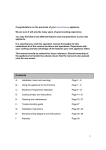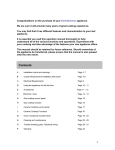Download AEG Electrolux Built-In Electric Oven User`s manual
Transcript
User’s Manual B3007H-L-B 30” Built-in Oven User’s Manual Congratulations on the purchase of your AEG appliance. We are sure it will provide many years of great cooking experience. You may find that it has different features and characteristics to your last appliance. It is essential you read this operation manual thoroughly to fully understand all of the various functions and operations. Experiment with your cooking and take advantage of the features your new appliance offers. This manual should be retained for future reference. Should ownership of the appliance be transferred, please ensure that the manual is also passed onto the new owner. Contents A- Installation check and warnings Page 3-4 B- Using the appliance for the first time Page 5 C- Electronic Programmer Operation Page 6-11 D- Cooking modes and instructions Page 12-18 E- Cleaning and maintenance Page 19-23 F- Trouble shooting guide Page 24 G- Installation instructions Page 24-30 H- Electrical wiring diagrams and instructions Page 31-32 I- Warranty Page 33 2 A- Installation check and warnings IMPORTANT: Please ensure that the oven cavity, venting and wiring is as specified in the relevant section G/H of this manual. A licensed electrician with relevant qualifications must perform electrical work when installing or servicing the appliance. The supply cable and fuse rating must be suitable for the appliance. You must never repair or replace any part of the appliance unless specifically recommended in the operation manual. Ventilation opening must not be covered or obstructed in any way. DO NOT use aluminum foil on the base of ovens The use of foil on the base of the oven to avoid spillage and improve cleaning is not recommended. The bottom element is concealed under the base of the oven liner (not exposed). Foil or dishes with reflective qualities must never be placed on the base of the oven during cooking as the concentration of direct and reflected heat will damage the enamel surface. Damage resulting from such use is not covered under the provisions of the warranty. Initial heat up Some smoke and smell may be noticed during the initial heat up cycle. This should quickly dissipate. If abnormal levels of smoke are observed (i.e.: it is not food that is burning), have the appliance thoroughly checked. Don’t use the appliance as a space heater The appliance must never be used for warming or heating the surrounding room. Combustible materials must never be placed on or near the appliance. Do not leave children alone Children must not be left unsupervised in the area where the appliance is in use. Children must never be allowed to sit or stand on any part of the appliance. Wear proper apparel when using the appliance Loose fitting, hanging or highly flammable garments (such as synthetics) should never be worn while using the appliance. Use only dry pot holders Moist or damp pot holders on hot surfaces may result in burns from steam. Do not allow pot holder to touch hot heating elements. Do not use a towel or bulky cloth when handling hot cooking utensils in the appliance. Oven compartments must never be used for storage Items, particularly flammable materials, must never be stored in an oven or near surface units. Do not use water on grease fires Fires or flame should be smothered using flameproof material or extinguished using a dry chemical or other suitable fire retardant. 3 Accessories Your appliance should come equipped with the following items. Single Oven – SEO 60, SEO 76, SEO 90 1 x pair of Retractable Slide Runners fitted to upper position and capable of being moved to any selected position as required 1 x Deep Enameled Roasting Pan with dual height reversible Grill Rack insert – ready for sliding into side rack positions or fitting onto Retractable Slide Runners 2 x Wire Oven Shelves that can be fitted into Retractable Slide Runners or for sliding into side rack positions Note: Additional Retractable Slide Runners are available as an optional extra and can be fitted at any time Note: Additional oven shelves and pans are available as optional extras. Double Oven – DEO 60, DEO 76 Note Upper Oven as per Single Oven above Lower Oven 1 x pair of Retractable Slide Runners to accommodate Enameled Grill Pan or Wire shelves 1 x Deep Enameled Roasting Pan with dual height reversible Grill Rack insert 2 x Wire Oven shelf that can be fitted onto Retractable Slide Runners or for sliding into side rack positions 4 B- Using the appliance for the first time After installation remove all notification labels (not identification or warning labels) and packaging materials. After cleaning make sure cleaned surfaces are thoroughly rinsed and wiped dry using a clean, soft cloth. NOTE: oven will not operate unless time clock is set The clock will require setting when you first turn on the power (or following a power failure). At the power on the timer shows the clock flashing and is increased by one unit every minute. The oven does not work and need to adjust the time. Burning in Before cooking in the appliance an initial pre-heating is required to burn off the fine oil film used to protect the elements for shipping. The first time you heat up the oven (or grill) the oil will be given off as smoke, which is perfectly normal. Select a cooking mode and set the oven temperature to 180°C. With the oven door closed, leave for approximately 5 minutes. Repeat the above step for each cooking mode. After completing the above make sure all controls are turned off. The oven is now ready for cooking and grilling. NOTE: On oven start up or possibly at other times, due to electricity supply deviations – the programmer may freeze on a function – if this occurs we recommend that, after checking other solutions without success, it is recommended that power supply be disconnected to the appliance and allow it to be in this position for some minutes before reconnecting. This may have a result of clearing the frozen position allowing you to reset the programmer for normal operation. Cooling Fan The Ovens are provided with a cooling fan motor to reduce the heat around the oven. The fan motor is activated, independently from oven temperature, at the start of cooking program. When you end the cooking program, a period of observation starts, during which the cooling fan is kept on if the temperature is over 50°C This safeguards both the oven and the adjoining cupboards from the possibility of temperature damage. Safety Thermostat Your oven is fitted with an over temperature sensor that will automatically shut down your oven for a period if it is deemed to be overheating- this sensor is fitted to the rear wall of the oven, inside the outer case – it will only activate in extreme circumstances and is provided as protection to the appliance and the adjoining furnishings. If activated it will shut down the appliance for a short time and will automatically reset allowing normal operations – you should consult your service technician if the problem re-occurs. 5 TOUCH-CONTROL KEYS The “touch-control” keys shell be operated by the fingers ( just touching the key ). When using touch controls it is best to use the ball of your finger rather than the tip. C - Electronic Programmer Operation Temperature display 1 2 1-2 temperature setting Timer functions display 3 3 Oven On-off 4 5 4-5Time setting 6 6 programmer functions selection Oven functions display 7 8 7-8 oven function selection 6 7 1 - DISPLAY Clock display With 4 digits, generally represents durations, hours, and info messages. It comprise 3 symbols representing operative conditions of times. Pot symbol If switched on, indicates a working cooking function, even if in manual mode. If flashing, it indicates the end of a temporized cooking. During delayed start period, it stays switched off, and then it switched on during effective cooking Auto symbol Normally it is switched off. If on indicates a temporized cooking is selected ( the oven is not in manual mode), and the pot symbol is on. If flashing together with the pot symbol, it indicates the end of a temporized cooking. During duration setting step, it flashes to distinguish from minute minder. Bell symbol Normally switched off. If is on indicates the minute minder active. If flashing indicates that the cooking operation is completed. Cooking program display It visually shows the selected heating elements in the cooking program. The oven light is always on during cooking operations. During delayed cooking, it stay switched off to indicate that visually represented cooking is not working. With the “Fan symbol”, in the case that cooking is of ventilated type, an animation is showed, composed of spades in fast succession rotating. During delayed cooking animation is suspended and 4 spades switched on are showed ( ventilation selected not working at the moment) Temperature display It shows the selected temperature and is equipped with both graphic symbol and progress bar to display a visual thermometer. 2.1 The clock will require setting when you first turn on the power (or following a power failure). At the power on the timer shows the clock flashing and is increased by one unit every minute. The oven does not work and need to adjust the time. 2.2 Setting the time The clock setting is only allowed with the oven on stand-by. Touch and hold button 6 more then 4 sec to set the correct time. Initially set the hours using buttons 4 and 5, and after waiting 4 sec you can set the minutes. The 6 button allows you to pass each other between the two settings. 8 2.3 Switching the oven ON / OFF Touch and release the button 3, the timer display shows “On” After two sec the oven light and the program display are on. If after one minute a cooking program is not activated, the oven light switches OFF and the oven goes in off position and the display shows “OFF” During cooking, to turn off the oven, touch and release the button 3 If ”Children Care” function is selected, the button release must take place at least after 2 sec., to protect accidental shutdowns. If “Children Care” is not active, the release may be instantaneous. Turning off the oven is actually two sec. after the appearance of the message “OFF”: if the button is pressed accidentally , simply press it again to “undo” the effect. WARNING - IMPORTANT NOTE Do not turn the oven off if you have set it for automatic or semi-automatic cooking. This operation will cancel the programmed cooking. Only the timer ( minute minder) operates in the “stand-by” condition. CHILDLOCK SAFETY ( ON SOME MODELS ) To activate the Childlock option touch the “ shows “n--0” and then “On”. ” key and hold until the clock/programmer display Then the time of the day appears again. The temperature display shows “ ”. When the Childlock option has been selected it is only possible to show programmes. In this setting it is not possible to change the oven cooking programme (cooking function, temperature) and the time selected for a semi-automatic or automatic cooking: if touching the relative keys “n--0” appears on the central display. If the oven is turned off (stand-by mode) it is only possible to operate the timer. To deactivate the “Childlock” option touch the “ hold until the clock/programmer display shows “n--0” and then “OFF”. Then the time of the day appears again. On the temperature display the “ ” key and ” symbol goes out. IMPORTANT: If the oven has been switched OFF (stand-by mode) with the Childlock option selected it is possible to turn ON the oven only after having deactivated the Childlock. 3.1 Minute minder This function does not interact with the loads, and is always available regardless the status of the oven. Pressing the button 6 the bell symbol is lighted. Set the time with the buttons 4 and 5, up to a maximum of 180 minutes, after 4 sec. the information is accepted and the bell remains lit. Pressing the button 6 after changing the value brings back to a timer clock mode, accepting the value you just changed. When the time elapsed, a tone sounds combined with the symbol bell flashes. To end both signals simply press any button. During minute minder setting step, it is possible to cancel the current value by pressing the button 3. 9 3.2 Manual cooking Switch on the oven as per the paragraph 2.3. Select the oven function, the oven temperature is suggested by default, can be changed by pressing buttons 1 and 2 3.3 Automatic cooking modes (Based on setting the duration “DUR”) Use automatic cooking to automatically turn the oven on, cook, and then turn the oven off. 1. Check the clock shows the correct time. 2. Select the function and temperature. The oven will come on. 3. Decide how long the food will take to cook. ” key and 4. Select “dur” (duration) on the clock/programmer display by using the “ ” or “ ” keys to set the then, with “90’”flashing on the central display, touch “ time in minutes (maximum 180 minutes - 3 hours). To reset the cooking time touch the ” key. “ 5. Decide the time you would like the oven to turn off; select “End” on the clock/programmer display by the central display, touch the “ using the “ ” or “ ” key and then, with the time flashing on ” keys to set the end of cooking time ” key to change between hours and minutes). (touch “ If there is time to wait before cooking starts, “A” will show in the clock /programmer display and the oven will switch off but is now set for automatic cooking. If you are already at home to turn the oven on and only want the oven to turn off automatically, start cooking as normal, then follow step 4 or step 5 to set a time to stop the oven. When automatic cooking starts, “ ” will be displayed and the oven will turn on. – To see the remaining cook time, follow step 4 up to display “dur” (duration). – To see the set stop time, follow step 5 up to display “End”. – To cancel automatic or semi-automatic cooking at any time see chapter “CANCELLING A SET PROGRAMME”. When the stop time is reached the timer will beep, “A” and “ ” will flash: – Touch any key to stop the beeping. – The oven will turn off on the “OVEN LIGHT” function. – Turn OFF the oven as indicated in the “TURNING THE OVEN ON AND OFF” chapter. Attention: after a power failure any automatic or semi-automatic programme is cancelled. Turn off the oven manually. During an automatic or semi-automatic cooking programme it is possible to change the cooking function and the temperature at any time. 3.4 Based on setting a cook stop time Turn the oven as indicated in the paragraph 2.3. Press the button “ ” three times,, ” or “ ”, the end of cooking time, the display shows “End”. Set with buttons “ falling in the next 23h59m. Apply for input time the same procedures of the clock setting: you set the hours and then the minutes. After 4 sec from the last push of a button, the oven will operate until the specified cooking duration time. Select a cooking function, the oven suggests a default temperature, the temperature can ” or “ ”,. be changed by using the buttons “ After the elapsed time, the oven enters in “Cooking end” mode 10 3.5 Fully automatic – (Start Later – Stop Later) Turn the oven as indicated in the paragraph 2.3. Select a cooking function, the oven suggests a default temperature, the temperature can be changed by using the buttons “ ” or “ ”,. The function is a combination of the two function of duration and end, to be set separately, without the constraints of precedence ( first the duration and then the end or viceversa). After 4 sec from the last push of a button, the oven will be in mode of delayed start: it will later operate automatically for the specified cooking duration and will stop at the set end cooking time. After the elapsed time, the oven enters in “Cooking end” mode. During the delayed start both the temperature and oven function are shown, and both are adjustable. The temperature bar remains off to remember that cooking is not currently running. All loads are turned off until the cooking will take action. 3.6 End cooking mode At the end of cooking time, the oven turns off all loads, it activates a triple beep intermittently; The temperature and programs display are switched off. The timer display shows the time of the day and the two symbols Pot and Auto flash. To unlock the oven, just press any button below the timer display: the acoustic signal ends, the oven is ready to receive new commands, you can select a new cooking function, or turn it off permanently with the button . 3.7 Cancelling a set program To cancel a set programme (“A” symbol activated on the programmer display): – Select “dur” on the programmer display by touching the key “ ” and then touch ” key. “ – A set programme is also cancelled when the oven is switched OFF in the “stand-by” mode. At the next power up the oven is not programmed. IMPORTANT: If the oven is ON, remember to switch it off manually otherwise it does not stop operating in the set mode. 11 D- Cooking modes and Instructions NOTE: cooking functions will vary from model to model – following is a description of the functions that are available and some or all of these functions will be included on the product you have purchased. By pressing the buttons 7 on the timer display appear “Pr01” “Pr02” etc… and program display Indicates the active heating elements in any cooking programs. On a same way each touch of button 8 decreases program number with consequent modification of the information provided on each display. The following table summarizes the operating parameters of each cooking mode. Display description On Pr01 Pr02 Pr03 Pr04 Pr05 Pr06 Pr07 Pr08 Pr09 Pr 10 Oven function Light Defrost/ food warmer Top + Bottom element Fan element + motor Top + Bottom + motor Grill Double grill Double grill + motor Bottom element + motor Bottom element + fan element + motor Bottom element Grill element Top element X Bottom element Fan element X X X X X X X X X Light X X Fan motor X Temp min. °c Temp preset °c Temp max. °c DEF/40 DEF 60 50 180 260 X X 50 180 260 X X 50 185 260 X X X 50 50 180 180 260 260 X X 50 180 190 X X 50 220 260 50 100 120 X X X X X 12 PREHEATING Preheating the oven is not essential, but you will achieve better results if you do. Some foods, particularly cakes and pastry, are better cooked in a preheated oven. Other foods, for example casseroles, cook just as well when cooked in a non-preheated oven but may need longer cooking times. For faster preheating select pizza mode and the required temperature and once the oven has reached the required level change to cooking mode/function for the task. To preheat the oven: 1- Set the mode required for preheating. 2- Set the oven to the desired temperature. Preheating guide (for 180°C settings) Cooking Mode Preheat Time CONVENTIONAL 15-20 MINUTES OVEN FAN OVEN 15-20 MINUTES NOTE: Any food or other cooking utensils placed in the oven during preheating will affect the preheating time. The preheat time may also vary with installations. WARNING When using an alternative cooking mode for fast preheat, be sure to turn the cooking mode to your required setting before placing food in the oven. HINT: To allow for heat loss while placing food into the oven, preheat the oven 10-20°C higher and then reduce the temperature to your required cooking temperature. Always preheat the oven when cooking multiple dishes at the same time. Roasting guide. These cooking charts are intended as a guide only. Temperature and cooking times may vary to suit individual tastes. Type of Meat Approx. 450 grams = 1lb Beef Veal Lamb Pork Cuts of Meat Time per lb (allow) Oven Temperature 0 C Prime Rib, rolled sirloin bolar blade, Top Loin, New York Strip Sirloin Shoulder or leg (with bone or rolled) Leg, shoulder (loin or rolled) Leg loin 60 minutes per 2lbs 1800 – 2000 40 minutes per 2lbs 1800 - 2000 40-50 minutes per 2lbs. 40-50 minutes per 2lbs 90 minutes per 2lbs. 1800 - 2000 1800 - 2000 2200-2300 / 1800-2000 13 Pork leg should be cooked at a higher temperature for the first 15-25 minutes then reduced to lower temperature for remaining cooking time. Type of Poultry Size of Meat Time per lb Chicken Whole or pieces 30 minutes per lb. Duck 3lbs – 4.1lbs Turkey 5.4lbs – 21lbs 30 minutes per lb. + 35 minutes extra 40-50 minutes per lb. + 35 minutes extra Oven Temperature 0 C 0 180 - 2000 1800 - 2000 1800 - 2000 Turkey should be well basted and turned during cooking Type of Fish Cuts of Fish Time per lb Fish Whole or fillets 10 minutes per lb. Oven Temperature 0 C 170-1900C In Conventional Oven mode, fish should be covered for the first ¾ of the cooking time to help retain moisture. Baking guide. These cooking charts are intended as a guide only. Temperature and cooking times may vary to suit individual tastes. Oven Temperature 0C 1300 – under General Times Very slow Foods Suitable Small meringues, pavlova, custard, reheating 1300 - 1500 Slow Rich fruit cake, light fruit cake 0 0 Moderate Casseroles, deep butter cake 0 0 Moderately hot Hot Shallow butter cakes, sponges, biscuits, meat loaf, baked fish Swiss roll, patty cakes, rock cakes, short crust pastry Very Hot Scones, Choux pastry 150 - 180 180 - 200 2000 - 2300 0 230 – and over DEFROST All foods may be defrosted using the Fan Forced Convection mode. It is important to note that the temperature is selected by default when using this function. As a general guide, the defrosting time for meat is approximately 15-20 minutes per kilogram. 14 PIZZA This function is also excellent as the fastest oven pre heat, engaging maximum power to heat the oven to a selected temperature before selecting an appropriate function and temperature for a task. In this position the fan and fan element together with the under oven element are engaged simultaneously. This is used for food that requires a concentration of cooking to the base, and allows the top to gently cook at the same time. For best results for pizza and similar items we recommend this function and may be combined with our optional pizza stone for perfect outcomes. CONVENTIONAL OVEN In this traditional mode, oven heat is provided from the top and under the oven compartment and is most suitable when cooking on a single shelf. For best results, arrange the shelves so the top of the food is near the centre of the oven. If cooking on more than one shelf, always preheat the oven and position the pans to allow as much free circulation of heat as possible. Depending on the food, you may need to rearrange the tray position during cooking. 1234- Adjust oven shelves to desired position/s. Select Conventional Oven mode. Set the oven to the desired temperature. When cooking is complete turn the oven off. HINT: If water is used in your cooking (such as water placed in a baking dish) the water will evaporate in the oven in the form of steam. The level of condensation will be reduced when cooking in fan oven mode where excess moisture is circulated and evaporates during the cooking cycle. NOTE: Stand clear of the oven when opening the oven door as steam may escape rapidly VERY LOW BAKE This function must be used in conjunction with the thermostat. Set the temperature between 50°C to 120°C. The door must remain closed 15 FAN ASSIST This style of cooking provides traditional cooking heating from top and bottom elements with the assistance of a circulation fan to ensure fast even results. This mode is most suitable for delicate cooking such as cakes, pastries, gateaux, biscuits and yeast dough. Best results when thermostat is set to 150-180 degrees – depending on recipe. HIGH BAKE The HIGH BAKE mode uses the oven fan to circulate air with heat from the under oven element. Quick and consistent heat is evenly distributed throughout the oven. The results are quick, not unlike a microwave oven. With the circulation of heat, foods cooked with high bake mode retain a crisp, dry texture on the outside especially pizza, pastry and other foods where you want the base to be well cooked. HIGH BAKE is also excellent for re-heating. 1234- Adjust oven shelves to desired position/s. Select HIGH BAKE mode. Set the oven to the desired temperature. When cooking is complete turn the oven off. FAN FORCED CONVECTION – most commonly used function In this mode the oven fan circulates heat from behind the fan cover to give a more even temperature throughout the oven. The even heat provides similar cooking results for each portion of food. Although temperatures for cooking foods in this type of oven are generally the same as required by a conventional oven, when cooking foods that require lengthy cooking cycles a fan forced oven normally cooks more quickly, saving time and energy. Always place the food as near to the centre of the oven as possible. If cooking on more than one level, arrange the pan positions to allow for free circulation of heat. 1234- Adjust oven shelves to desired position/s. Select FAN OVEN mode. Set the oven to the desired temperature. When the cooking is complete turn the oven off. HINT: Always preheat the oven when cooking on multiple shelves at the same time. Depending on the food, you may need to rearrange the tray positions during cooking. 16 FAN GRILL NOTE: Door must be closed in Fan Grill Mode Fan grilling is a combination of direct heat and circulated hot air which gives the appearance and flavor similar to rotisserie cooking which is ideal for single level roasts. Direct infrared heat from the grill element is circulated by the fan to cook the food, which should be positioned as near to the centre of the oven as possible. For best cooking results, it is recommended that food be turned once only. 1- Oven door must be closed in Fan grill mode. 2- Place food on grill rack and pan supplied (ensure grill rack is inverted to the high position to allow best circulation of air) as close to the centre of the oven as possible. 3- Select FAN GRILL mode. 4- Set the oven to the desired temperature. (see note below and refer to FAN GRILL temperature guide). 5- When cooking is complete turn the oven off. NOTE: Large grill pans or roasting dishes can restrict the circulation of air in the oven. To prevent moisture condensing in the cooler lower sections of the oven, preheat the oven for approximately 10 minutes, using CONVENTIONAL OVEN or HIGH BAKE modes, prior to fan grilling. NOTE: The temperature setting in FAN GRILL mode must not exceed 200°C. Fan grill guide These cooking charts are intended as a guide only. Temperatures and cooking times may vary to suit individual tastes. Type of meat/poultry/fish Chicken – whole pieces Lamb - loin/rack Chops - medium/rare Chops – medium Beef- Steak – rare Steak – medium Steak – well done Pork Chops – medium/rare Chops - medium Chops – well done Sausages- thin thick Fish fillets Oven Temperature 0C 1750 - 1850 1850 - 1950 1750 - 1850 1750 - 1850 1750 - 1850 1750 - 1850 1750 - 1850 1750 - 1850 1900 - 2000 1750 - 1850 1750 - 1850 1750 - 1850 1750 - 1850 1750 - 1850 Approximate Cooking Time 30 minutes per lb 15-20 minutes 25 minutes per lb 10-12 minutes 14-16 minutes 6-8 minutes 8-12 minutes 12-15 minutes 6-10 minutes 10-12 minutes 12-15 minutes 8-10 minutes 12-14 minutes 10-14 minutes Sliced vegetables Tomato halves Crumb Based dishes Pasta dishes 1800 - 1900 1900 - 2000 1750 - 1850 1750 - 1850 20-30 minutes 6-8 minutes 20-30 minutes 20-30 minutes 17 FULL GRILL & HALF GRILL This mode of cooking uses infrared heat from the top of the oven to cook foods to your requirements. Half grill engages only the inner band of the top element and is suitable for smaller volumes and has a consequently lower energy usage. This method of grilling in the oven is recommended for short duration (5 minutes or less) grilling only, which is ideal for toasting (see note below). Foods with higher fat content or foods, which require more than 5 minutes grilling time, should be grilled using the FAN GRILL mode. When in GRILL mode the oven door should be closed. If the door is not closed, over time discoloration to the control panel may occur. 12345- Commence grilling from a cold oven whenever possible. Place food on grill rack and pan supplied. Position the shelf to your preference. Select GRILL mode and, turn to your desired heat setting. When cooking is complete turn the oven off. NOTE: The grill element is controlled by the oven thermostat. Once the temperature in the oven has reached the selected temperature the element will switch off, and then on again, when more heat is required. 18 E- Cleaning and Maintenance 1. Cleaning and maintenance Proper cleaning and care of your appliance is essential to maintain its appearance and durability. NOTE: People with sensitivity to cleaning chemicals must take the necessary precautions. It is recommended that protective gloves be worn while cleaning the appliance. Routine cleaning of the appliance should only be performed when the appliance is at room temperature. Do not use any acid or caustic cleaners, abrasive powders or scourers on the interior or exterior of the appliance. Substances or items with these properties may discolor or damage the finishes of your appliance. If any abrasive, acidic or caustic substance or cleaning agent should come into contact with the appliance, rinse off immediately with water, taking special care to avoid injury if surfaces are hot. When using the appliance, it may be soiled by food spills and spatters or foreign items such as plastics accidentally coming into contact with warm or hot surfaces. Foods which contain acidic substances or sugar can discolor or damage enamel finishes. The enamel interior of the oven is a hard durable finish which is resistant to wear and discoloration. However, to maintain the appearance and durability of the finish any spills must be wiped off immediately. This should be done even if still hot and necessary precaution must be taken to avoid injury. Once cool the affected area should be thoroughly cleaned and rinsed using non-abrasive, mild cleaning detergents and water. 2. Care for stainless steel No metal is indestructible and certain procedures should be followed to maintain the finish and durability of stainless steel. Never leave stainless steel items unwashed. The surface responds best to gentle cleaning methods, scouring materials and harsh abrasives should not be used. Frequent washing with water (preferably hot) is the recommended treatment, followed by rinsing with fresh clean water and wiping dry with a soft cloth or paper towel. A little soap or detergent may be added to the washing water but too much can produce a cloudy film over the appliance. Use of steel wool is not recommended but stainless steel wool (a fine mesh pad) is an excellent cleaning aid. Oil or grease in the washing water can leave a rainbow film when it dries. It can easily be removed by simply using polishing and cleaning methods described previously. Thoroughly rinsing with clean water is the real secret and it a surprise how easily stainless steel can be kept sparkling clean by using the above simple method. Never leave stainless steel to dry by itself. 3. Only place cookware on oven shelves. Other surfaces such as trims are not totally resistant to hard materials or direct heat and may be permanently damaged by such use. 19 Recommended cleaners Mild detergents and warm water together with a clean, soft, non-abrasive cloth achieve goods results for normal cleaning. Diluted washes with ammonia and water should rinse away any adhesive residue or gummy deposits on the appliance surfaces. Eucalyptus oil (small amounts) is also good for removing adhesive residue. Alcohol based products (eg: methylated spirit, etc.) are not recommended. Brand name cream cleansers and concentrates, without abrasive qualities, can be used in small amounts to break down greasy deposits and dirt. After cleaning make sure cleaned surfaces are thoroughly rinsed to prevent any risk of baked on cleaner residues and wipe dry with a clean, soft cloth. NOTE: When cleaning stainless steel surfaces AEG recommend 3M brand or Advance stainless steel cleaner. Other reputable brand cleaners specifically formulated for cleaning stainless steel may also be acceptable. Do not use steel soap pads or abrasive scourers of any kind. The abrasive qualities of these pads will ruin the even brushed finish of the stainless steel and any residual metal fibers may corrode causing a rusty/dull appearance. Metal polishes with abrasive qualities are also not recommended. WARNING: Do not use any acid or caustic cleansers or abrasive powders or scourers on the interior or exterior of the appliance. Routine cleaning Ensure all controls are in the off position and the appliance is cool before cleaning. When wiping stainless steel surfaces with a brushed finish, wipe in the same directions as the brushing. To clean the oven interior, fully open (side opening door/s) or remove the door/s (top opening type, see opposite page) for better access while cleaning. The shelves and shelf guides can be lifted out for cleaning by removing the relevant thumb screws. The shelves and shelf guides can be washed manually but are also dishwasher safe. If using commercial oven cleaners, choose only non-caustic cleaners and follow the manufacturer’s instructions. Avoid contact with elements, rubber door seals and exterior surfaces. After cleaning make sure all surfaces are thoroughly rinsed and wiped dry with a clean, soft cloth. Self Cleaning Panels The range is equipped with 3 panels ( 2 sides and rear ). They are attached to the sides by removing the rack guides assembly and placing the self cleaning panels against the oven side. The rear panel is attached with screws, ensure that the «rough» side is facing out. These liners are «self cleaning» during the cooking. If residue remains on them after cooking, empty the oven of food, and remove all shelves and pan, and turn the selector to Conventional oven ( top and bottom element ) and thermostat to MAX; 15-20 minutes should be adequate to clean the panels using this method. 20 How the Self cleaning panels work. The self-cleaning oven panels go through a special enamelling process which ultimately creates a rough surface (this is the side which should face outwards in the oven). Because of the structure of the surface, it is extremely porous and attracts oxygen. When the splashes of grease hit this surface it immediately spreads. In this way, immediate oxidization of the grease occurs, and it ultimately disappears while the oven is in general use at standard cooking temperatures. The self cleaning panels are located on the sides and on the rear of the oven, and are designed to cope with fatty stains very efficiently. For stains on the bottom of the oven, the usual causes are sugar or starch overflows. The self cleaning panels are manufactured using a special enamelling process The base of the oven should cleaned by using soapy water ( see procedure to page 15-16) on a soft clean and newspaper BEWARE: Never use silicone films (polish or cleaners) on self-cleaning panels - they will be rendered useless. Similarly, NEVER try to wash with detergent, or use abrasive cleaners on the panels Drop Down Grilling Element The removal of a single screw at the front of the upper grill element allows the grill to drop down to facilitate the cleaning of the oven ceiling. On completion of cleaning, simply replace the grill element and secure with the screw. To avoid smoking, use a clean, damp cloth to regularly clean oil and fat splatters from the exposed drop down grilling element. The fan cover can be lifted out for cleaning separately by removing the retaining screws. The fan blade can also be removed for cleaning if necessary. NOTE: that the fan blade nut has a left-handed thread. 21 Removing oven door (pull down door models only) The oven door can be easily removed for better access while cleaning. To remove the oven door: 1. 2. Open the door fully and fit the supplied pin in the hole. Raise the door slightly, holding the sides of the door about half way up. Make sure the pin stays in the hole the whole time. Lift the door gently. This should disconnect the hinges from the oven frame. 3. Remove the door by continuing to raise it while pulling the door away from the oven. When handling the door be careful not to dislodge the pin off the hole. If the pin does dislodge, the hinge will have to be closed by hand and the pin re-fitted onto the hole before re-fitting into the oven. To re-fit the oven door: i. ii. iii. Holding the door at an angle to the oven, slide the hinges into the oven frame, making sure that on each side the top curved arm fits into the top slot and the lower arm fits into the bottom slot. Make sure the hinges are pushed as far as they will go and the lower arm engages into the plate mounted in the oven frame. Open the door fully and ensure the pin fully disengages from the hole. The door can now be opened and as normal. 22 How to Rotate Doors in the Double and Single Oven NOTE: Side Opening Only This should only be done by a qualified person or installer. We recommend that it be a two person task to ensure support of the heavy door apparatus during changeover. Damage done to the appliance during a door rotation may effect the warranty provision for the appliance. Stage1: REMOVE THE BOTTOM DOOR FOR DOUBLE OVEN OR THE MAIN DOOR FOR SINGLE OVEN a) Remove the screws fixing the hinge to the oven front frame, being careful to support the door, then remove the door and place in a safe place b) Remove the door catch by removing the two screws top and bottom of the door latch on the opposite side of the oven front frame to the hinges c) Remove the screws fitted in the thread holes in the oven front frame to allow the repositioning of the door hinge to the opposite side Stage 2: (FOR DOUBLE OVENS ONLY) REMOVE THE TOP DOOR AS PER STAGE 1 ABOVE AND LEAVE IN POSITION THE FITTED MIDDLE SPACER 4. Remove the screws fixing the bracket of the middle spacer profile 5. Remove the screws fixing the hinge of the top door 6. Remove the door with the middle profile fixed to the hinge, rotate 180° place in a safe place ready for re-affixing Stage 3: FITTING THE DOORS – FOR DOUBLE OVENS AND SINGLE OVENS 7. For Double Oven re-fit the bottom door first by fixing the hinges with their screws; fix also the bracket of the middle spacer profile at the same time 8. Re-fit the top door after having rotated it by 180° 9. Re-fit the two door catches in the appropriate oven front frame position – minor adjustment available later to ensure accurate receipt of door striker pin 10. Re-fit the remaining screws in the thread holes in the oven front frame The changeover is complete – please check that all screws are fully tightened and that the striker pin is accurately received by the re-located door latch. Changing the light globe The light globe is located behind the glass cover and is a screw-in type. To change a light globe: 1- Gently lever out the glass cover only. 2- Pull the light globe and push in a replacement globe. 3- Replace the glass cover making sure it fits correctly into place. NOTE: Recommended globe: Halogen 40W 23 F- Trouble Shooting Guide Symptom No power supplied to appliance Oven power is on but appliance does not operate Oven power is on but there is no heat Rubber seal has gap/s at bottom and ends do not meet Display is flashing, is only part illuminated or is cycling through various displays. G- Remedy Has the power been disconnected? Check the meter box. Has the main fuse or circuit breaker blown or tripped? Oven may be set on AUTO (see auto programmed cooking) Oven may be set on AUTO Oven temperature may be set OFF Mode may be on incorrect selection Correct - doors are sealed this way for oven venting purposes Turn power supply to appliance off, wait 30 seconds and turn power on. Reset clock Installation instructions. INFORMATION FOR THE INSTALLER THE GRAB HANDLES MUST BE USED TO MOVE THE OVEN. WHEN THE OVEN IS HALF FITTED IN THE CABINET, IT IS POSSIBLE TO REMOVE THE TWO HANDLES BY UNSCREWING THE FOUR FIXING SCREWS. DO NOT LIFT OVEN BY THE FRONT DOOR AS THIS WILL DAMAGE THE OVEN WARNING: Installation must comply with Standards North America (within North America) wiring rules, as well as your local electrical and building codes and regulations and any other applicable requirements. Your appliance must be properly installed and grounded by a qualified and licensed technician. Incorrect installation of the appliance, resulting from the kitchen maker not following the detailed installation specifications, can affect the appliance performance. Ovens incorrectly installed may invalidate the warranty and we strongly recommend that the oven cavity and venting be prepared, as described, in the following specifications. This is critical to appearance, oven performance and safety. Measurements Please note that all dimensions provided are in millimeters (mm.) The sizes allow for only a small degree of error so all cut-outs must be precise and square. To ensure the cabinet is well finished, the cut edges must also be square and care taken to ensure the cut edges are free of chips. 24 SEO 60 - Single Oven Measurements 610 mm 615 mm mm 558 55 5m m mm 600 VOID (Cut-out) 614 mm Cut-out: 56 5 mm m 570 m 25 SEO 76 - Single Oven Measurements 615 mm 608 mm m 63 5 m 55 0m m m 7 58 m VOID (Cut-out) 614 mm Cut-out: 56 5m m m 724 m 26 SEO 90 - Single Oven Measurements 608 mm 615 mm m 7 70 m Cut-out: m m 896 mm VOID (Cut-out) 614 mm 56 5 58 5 m m m 860 m 27 DEO 60 - Double Oven Measurements 1140 mm 1135 mm 560 mm 55 0 m m 600 mm Cut-out: 1136 mm VOID (Cut-out) 56 5 m m 570 mm 28 DEO 76 - Double Oven Measurements 1140 mm 1130 mm m 63 5 m 55 0 m m VOID (Cut-out) 1135 mm Cut-out: 56 5 m m m 724 m 29 Preparing the oven cavity We recommend mounting ovens on plinths (see previous page) and flush mounting installation (refer securing the oven below). WARNING: It is important to the performance of the oven and the protection of adjoining cabinets that the following installation preparation is observed. 11. The oven cavity floor should provide plinths to left and right side approximately 4” wide with the maximum clear opening to base under oven. Allowing a satisfactory free area through the middle to assist with air circulation around the appliance. 12. The rear wall of the oven cavity should not have a back attached – it should be clear to allow for improved air circulation around the appliance. A space of at least 4” (but more if possible) to any rear wall is recommended. The above steps will greatly reduce the outer oven surface temperatures making the kitchen environment safer. It will also protect both the appliance and the adjoining cabinets. Securing the oven Once correctly wired into (while electrically isolated from) the main power, locate the oven into the recess and ensure the appliance is parallel to the front fascia of the enclosure, use packing under the appliance if necessary. Four screws are supplied to secure the oven to the cupboard cavity. The fixing holes are in the oven trim surrounds (visible when you open the oven door/s). Slide the oven fully into the recess and insert the four screws through the mounting holes and into the cupboard surround to secure the oven position. We recommend a flush to cupboard face installation. The measurement of the front trim of the oven (20mm) is designed to equal normal cupboard facing material after allowing for the body of the oven to be secured against the cupboard carcass. 30 H- Electrical wiring diagrams and instructions WARNING: All aspects of the installation must conform with the requirements of the standard North America (within North America) wiring rules, as well as your local electrical and building codes and regulations, and any other applicable requirements and conditions of your local power supply authority. A licensed electrician must perform the electrical work when installing this appliance. The supply cable and fuse rating must be suitable for the appliance. 240 Volt 60hZ 30AMP single/40AMP double service WARNING: A licenced electrician must connect the armour cable and 3 wires into the electrical connection box. The white, or Neutral wire is not used, and must be capped using a marette. To avoid power borne interference, this appliance must be installed individually on a separate and distinct final sub-circuit. Note: To the electrician – please ensure sufficient supply cable is provided to allow the appliance to be removed from the cavity should any servicing be necessary. This will also allow easy connection of the supply. Voltage supply connection To connect the electrical supply: 1- Ensure the supply cable and fuse rating are suitable for the appliance (see the electrical loading). 2- Remove the cover plate by undoing the screw. 3- Fit a suitable entry bush to the conduit entry on the rear left of the appliance (with the rear toward you) and feed the fixed wiring through. 4- Connect the wiring to the terminal block using the screw connections provided. Ensure the wires are properly secured to prevent any high resistance electrical connection. 5- Replace the cover plate making certain that the supply wiring is clear of any metal work and the screws. When connected to a sub circuit, protected by a circuit breaker, it is recommended the circuit breaker be the same as the total rating of the appliance. Electrical Loads Main Oven Oven Grill Oven fan and light Secondary Oven Oven Grill Oven light and fan TOTAL RATING Single Oven 2350 W 2800 W 90 W Double Oven 2350 W 2800 W 90 W 3.69Kw 2900 W 2000 W 90 W 7.0 kW 31 32 Q- Warranty AEG products are designed and built to the highest standards. We expect your appliances to provide many years of trouble free enjoyment. In the event of an appliance requiring attention, each appliance is covered by a 2 year warranty from the date of purchase. Refer to warranty policy for complete terms and conditions. Coverage is for costs of parts and labor for appliances in capital cities & metropolitan areas. We reserve the right to charge directly for handling expenses outside the metropolitan region. AEG products are supported by a national service support system. Call our customer service department for attention. Please retain your invoice AEG to quote should you require service assistance. This will identify your product for our priority service back-up. Please attach your invoice to this manual for easy future reference. AEG Canada 871 Cranberry Court Oakville, Ontario L6L 6J7 Canada Tel 905-829.3980 Fax 905-829.3985 email [email protected] For Service & Spares: EURO-PARTS 1.800.678.8352 Important: Please record details of your purchase below and mail or fax to AEG -----------------------------------------------------------------------------------------cut along line ------------------------------------------------------------------------------------ Name: Address: City : Where purchased: Items Serial No. (s): TEL No State: Zip Code: Purchase date: purchased: 33 AEG appliances are imported and distributed in North America by Euro-Line Appliances Inc. For more information visit www.euro-line-appliances.com / www.elawest.com 871 Cranberry Court Oakville, ON L6L 6J7 Canada Toll Free: 1.800.421.6332 Showroom: 905.829.3980 [email protected] 2912 West 4th Ave Vancouver, BC V6K 1R2 Canada Toll Free: 1.855.352-9378 Showroom: 604.235.3980 [email protected]












































